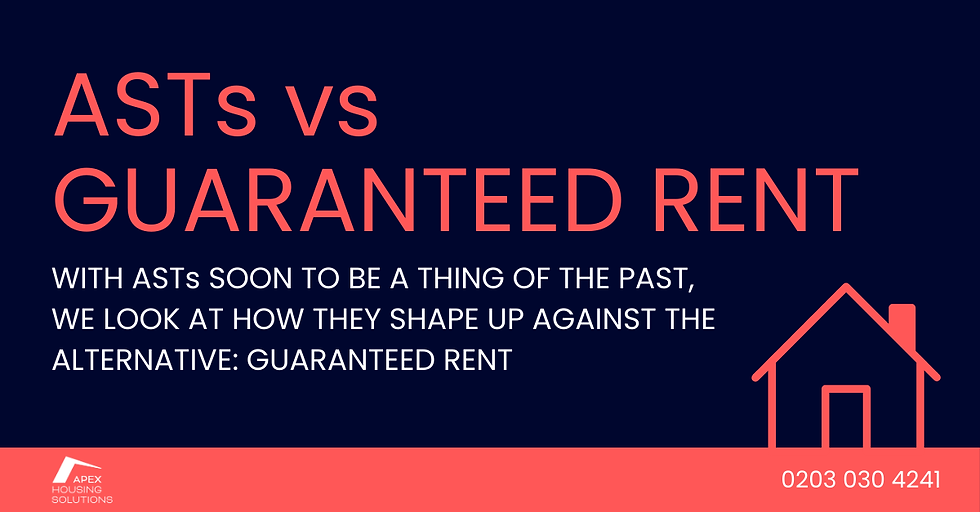Renters Rights Bill: Where We’re At (and What Was Rejected): Guaranteed rent perspective
- Apex Housing Solutions

- Sep 9, 2025
- 3 min read

The Renters Rights Bill continues to edge its way through Parliament and this week it entered what’s known as the Ping Pong stage. That’s when the House of Commons and House of Lords go back and forth on final amendments. Think of it as a political rally match, just without the sportsmanship.
On 8 September, the Government used its majority to push back on several key changes the House of Lords had proposed. Most of those suggested amendments were overturned.
Here’s what was rejected and why it matters.
No to a Separate Pet Deposit
An attempt to introduce a separate pet deposit (up to three weeks’ rent) was voted down. The Government’s position is that existing rules are enough. Their concern? That adding more upfront costs would stop tenants with pets from being able to rent altogether.
Fixed-Term Contracts (Still) Off the Table
One of the bigger sticking points continues to be around fixed-term tenancies. The Lords pushed to give landlords of smaller student properties similar flexibilities that larger HMOs already have under Ground 4A.
The Government wasn’t having it.
Only purpose-built student HMOs remain eligible for fixed-term cycles. For everyone else, tenancy agreements are expected to move to open-ended, rolling arrangements. It’s worth flagging that this will change the shape of the rental market significantly, especially for landlords used to setting fixed terms - a key reason why Guaranteed Rent will fast become a stronger option for landlords.
Landlords Can’t Re-Let So Quickly After Selling
Another Lords proposal was to cut the re-letting restriction from 12 months to 6 months for properties repossessed under the grounds of sale. The Government rejected this too, arguing that the 12-month period protects tenants from landlords using the “I’m selling” excuse just to get vacant possession.
No New Ground for Carers
A new possession ground for landlords wanting to house a carer (for themselves or a family member) didn’t make the cut either. The current view is that existing grounds already give enough flexibility for this kind of scenario.
No Change to the Burden of Proof
The Lords also tried to shift the burden of proof in civil penalty cases, including those involving bidding wars and rental discrimination. That was overturned. The Government’s view is that the current legal threshold is fair and in line with other regulations.
Small Expansion to Ground 5A
The one small change that was accepted? Ground 5A has been widened slightly. Agricultural landlords can now seek possession to house not only employees but also self-employed agricultural workers.
What Happens Next?
There’s no date set yet for when the House of Lords will respond to the Commons' changes. With Parliament heading into recess for the party conference season on 19 September, don’t expect any major developments before then.
For now, everything is still in play and until both Houses agree on the final version, it won’t move to Royal Assent.
Why This All Points Towards Guaranteed Rent
While the politics bounce back and forth, one thing is becoming clear: landlords will have less control and more risk under the new system.
Fixed-term contracts are going. Possession grounds are narrowing. And managing a property through these changes is going to require more time, more knowledge, and more resilience.
That’s where Apex’s Guaranteed Rent model comes in.
No tenant risk
No missed rent
No court battles
No negotiation over possession
No trying to understand what Ground 5A even means
We sign the lease. We pay the rent. We manage the occupant. And you keep the asset.
Want to know more about how this works, or what it looks like over a 3–5 year period? Get in touch. We’ll walk you through the numbers and show you how it compares to the increasingly unpredictable AST model.




Comments